Peter MALONE
Saturday, 09 October 2021 13:00
Promised
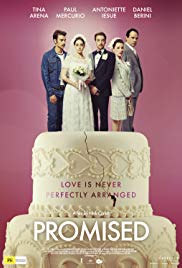
PROMISED
Australia, 2019, 97 minutes, Colour.
Antoniette Jesue, Daniel Berini, Tina Arena, Paul Mercurio, Mirko Grillini, Santo Tripodi, Sunday Barka Irving, Vince D' Amiko.
Directed by Nick Conidi.
The ‘Promised’ of the title refers to promises of marriage, not by the partners who commit themselves but by their parents, when they were little children, a marriage arrangement. One of the characters hearing about arranged marriages remarks that this happened only with Indian families. On the contrary, this is an Italian Australian story.
Promised offers an opportunity for Australians of Italian descent to look back at the traditions, the family pressures, Italian community patronage – taken for granted in the past, beginning to be questioned by the 1970s. It is also an opportunity for the wider Australian audience to enter into the life of the Italian communities.
The film was written and directed by Nick Conidi, his first film. With his thanks at the end to his parents for supplying Super-8 footage of a honeymoon in Italy, it seems that this is a very personal story, one that he knows will and wants to communicate to the audience.
At first, we are taken back to 1953, a seemingly serene era in Australian society, mellow photography with the glow of nostalgia, the rather proper suits and dresses, family ceremonies – especially with a little girl crying and a young boy putting a toy beside her, and she stops contentedly. This is the moment of the promise, the boy and the girl promised to each other – by their parents, especially their fathers.
There are quite some changes in Australian society by 1969, the girl is at school studying, the boy is being sent to Oxford to study law. But, the fathers with their eyes still determinedly on their children.
Most of the action takes place in 1974, Robert (Daniel Berini) returns from Oxford, his father setting him up with a legal office, and his being taken to a lavish suburban house, to be his when he marries Angela (Antoniette Jesue). How will Robert cope with his father’s expectations? Angela, on the other hand, studying and writing, has a boyfriend who is setting up an entertainment business. She has no intention of marrying Robert, the promises were made by her parents, not by her.
Obviously, by this stage, audience sympathies will be with Angela, trying to explain the situation to her boyfriend, discussing the situation with Robert. His father, a local Godfather, intervenes, with some dire consequences. Angela’s father and mother (Paul Mercurio and Tina Arena) are wary.
Where this film different from many others is that, while the wedding has to take place, the marriage is lived only on the surface – but, quite some emotional complications, Angela dealing with the disappearance of her boyfriend, Robert trying to make some approaches to his wife, some mellowing, some severe misunderstandings, and a reminder that whether the marriage is arranged or entered into freely, the key importance is that the spouses make the effort, take the time, to appreciate each other – and fall in love, the grounds for any successful marriage.
1. An Australian story, the 1950s to the 1970s? An Italian Australian story?
2. The title, arranged marriages, the comment on Asian arranged marriages, the reality of European arranged marriages, the Italian tradition?
3. 1953, the Australian suburbs, the application of the atmosphere, families, the Italian migrants, meetings, meals, a more genteel era? Angela in the cot, crying, Robert putting the bear in the cot and her stopping crying? The two father’s and their decision about the marriage that must be?
4. 1969, changes in Australian society, more open, the Italians, Italians from Sicily, the traditions, patriarchy, the role of the Godfather, helping all the members of the family, making decisions, decisions that were absolute? Angela growing up, at school, the crush on Robert? Robert and his going to Oxford, the dance, his not dancing with her – but the later revelation of his picking up the ribbon?
5. 1974, Angela, studying, writing short stories, chatting with her girlfriend who did not share the Italian background, enabling the screenplay to highlight for the audience the strictures within the Italian family, expectations? Her relationship with Tom, in love, his love for her, his setting up his entertainment business? Robert returning from Oxford? The two families and their talking about the arranged marriage, the expectations? Angela not wanting to follow through, to defy the family? Explaining to Tom? Robert’s return, having a girlfriend in England, his reaction to the expectations?
6. Robert, lawyer, his achievement in Oxford, his proud father and mother, setting up his office, his law practice, the gift of the house when he was married? Angela explaining the situation to him?
7. The intervention of the fathers, calling Tom in, revealing his betting debts, the need for money for his business, the offer of the cheque, Tom’s reaction? Angela finding him with the result of the bashing? Tom, leaving, accepting the money?
8. The father’s intervening, four weeks to the wedding reception, going to the Capri, the old uncle and people looking down on him yet relying on him (and the speculation about his relationships and his relating to the woman, the dancing, close friend?) The meeting with Angela and Robert, the discussion about the menu, their being urged to dance together?
9. Angela, her relationship with her parents, confiding in her mother, their knowing about her relationship with Tom? Her father and his background from Sicily? His later explanations to Angela about his being not seen as worthy to marry his wife?
10. The wedding, the ceremony, the priest, going through the rituals? The reception, keeping up appearances? The marriage night, Angela taking her stands, the separate room, the effect on Robert, drinking? Non-consummation? The travel to Europe? The super eight films?
11. The return home, Robert and his practice, the details of clients, his consideration? Angela and her studies, her writing? Discussions with her friend? The couple keeping their distance?
12. A gradual mellowing, the two talking together, going on a date?
13. The background of the secretary at the office, Robert’s friend and his attraction? The later mix-up, Angela seen the couple, assuming it was Robert, her harsh reaction, especially as they were becoming close? Her leaving, Robert concerned, the possibilities for the annulment, the documents?
14. The revelation of the discussions in the past, especially with Tom? The parents, Robert and his decision to go through with the wedding? His actual love for Angela?
15. The reconciliation, the secretary doing the decent thing and phoning Angela?
16. The irony of the arranged marriage, the rebellion of the younger generation, the plans for alternate relationships? Get the irony of the two spending time together, getting to know each other better, sharing – and the arranged marriage turning out to be the authentic marriage?
Published in Movie Reviews
Published in
Movie Reviews
Saturday, 09 October 2021 13:00
Season in France, A
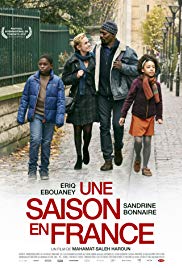
A SEASON IN FRANCE
France, 2017, 100 minutes, Colour.
Erique Ebouaney, Sandrine Bonnaire, Aalayna Lys, Ibrihim Burama Darboe, Bibi Tanga.
Directed by Mahamet Saleh Haroun.
This is a strong social justice film. The focus is on a man from the Central African Republic with his daughter, fleeing the country, his wife killed in an uprising. He works at a market, has made an application for permanent residence which is rejected. He is given 30 days to make an appeal or moved from France.
The screenplay gets inside the head of the man, his torment, his inability at times to act rationally. He is supported by a sympathetic woman, played by Sandrine Bonnaire. There is also a friend, a former professor, whose mental health is also deteriorating.
The film is strong in its appeal to humanity of the French, a counteraction to the demands that migrants move out, but a look at the plight of human beings who have suffered and are victims of bureaucracy and unsympathetic society.
1. The title? The focus on immigrants, refugees, French government, authorities?
2. The city setting, apartments, workplaces, official offices, the streets? The musical score?
3. The focus on Abbas, his background, Central African Republic, rebellion, the death of his wife, refuge in France with his children, his background as a teacher, limited time in France, his working in the markets, his friendship with Carol, depending on her? The bond with his children, doing his best for them? The 30 days, his making applications, the documents telling him to leave? His not making an appeal? His friendship with Etienne, the sharing of books? Finding temporary shelter, his angers and losing his job, the family ousted, going to live with Carole, the authorities questioning her, his packing and leaving? Future?
4. Carole, the bond with Abbas, sharing, the relationship, her care for the children? Giving him accommodation? The police interrogating her, going to the office, returning to find him gone?
5. The children, their age, experience, settling, school, having to move, continued difficulties, with Carole?
6. At the end, the past, professor, the reader, friendship with Abbas, the girl, his hut, its being burnt down? Setting himself on fire, in the office, hospital, his death?
7. A grim portrait of the plight of refugees and friends? The challenge to authorities and to French society?
Published in Movie Reviews
Published in
Movie Reviews
Saturday, 09 October 2021 13:00
Delirium

DELIRIUM
US, 2018, 96 minutes, Colour.
Topher Grace, Patricia Clarkson, Genesis Rodriguez, Callan Mulvey, Robin Thomas.
Directed by Dennis Iliadis.
As we watch this drama and thriller about mental conditions, we wonder how much is real, how much imagined, how much is actual delirium.
Topher Grace plays a man returning home, to a mansion owned by his father who has just suicided, from a mental institution. He has an ankle brace, is confined to the house, has a parole officer played by Patricia Clarkson, tough but not particularly sympathetic to her charge.
The man is haunted by noises in the house, rings for groceries to be delivered and makes friends with the young woman, Genesis Rodriguez. The screenplay gradually fills in the background, the man and his older brother and murders of young women, the brother going to jail. Then he reappears.
The film has moments of realism but, then there are the mysterious sounds, the burnt face of the brother, his appearances and disappearances, the visits of the parole officer, moments of violence.
So, this is a dramatisation of delirium, dealing with the past, possibility of rehabilitation, and the four of questions always in the audience’s mind, how much is real, how much is happening in the man’s head, and is he schizophrenic, creating the other characters but acting out his own experiences as well as the violent experience of his brother.
The ending of the film offers no definitive answer.
1. The title? Indications? Madness, mental health, hallucinations?
2. The institution, release? The mansion, exteriors, the interiors, the range of rooms, décor, the basement? The tunnels, rooms, safes? The musical score?
3. Tom’s story? The screenplay filling in the background, the two brothers, the mother and her devotion and her disappearance, the father and his demands, the home video films, his political career, his suicide? The two boys, the girl, Alex and his killing the girl, Tom watching? The later murder? Alex in prison? Tom institutionalised?
4. The issue of reality and unreality? How much of the story was fact? How little? Tom in the institution, his being released, Brody and her supervision, his parole situation, the ankle signal? Not allowed outside the house? Answering the phone and his being photographed? The risks of the police coming?
5. How much of the events were in Tom’s mind? The visuals suggesting reality, the presence of Alex, the visits by Brody, her harshness, the sexual approach, her being killed? Lynn, bringing the groceries, her attraction, revisits, coming inside, Tom sharing with her? The sinister presence, the sounds, his searching the house, the secret passage, with the eyeholes? Alex’s arrival, escape from prison, Brody saying that he had been burnt in a prison fire? His burnt face? The discussions, the taunts, the attack on Lynn, the repartee rap repetition of the murder of the girl and Tom’s observing?
6. Alex, presence, sense of menace, memories of his father, of the killings, his power over Tom, the continued menace in the house? Appearing and disappearing? His taking Lynn, the brutality, the taunts? His wanting the money, Tom going to the basement, then as hostage, the time limit, opening the safe? The bullets, the water from the swimming pool?
7. Tom, settling in, his room, unpacking, watching the home movies from the past, the portrait of his father? Answering the phone, not going outside, searching the house, the sounds? Interaction with Brody?
8. The buildup to the climax, the presence of the swimming pool, Tom swimming, the cover almost killing him? And the water into the basement?
9. The reappearance of his mother, imprisoned, Alex and his taunts, her attacking Alex, trying to save Tom? Her death?
10. The end, an open door, Tom still in the institution or having a new life?
Published in Movie Reviews
Published in
Movie Reviews
Saturday, 09 October 2021 13:00
Yellow Bird, A
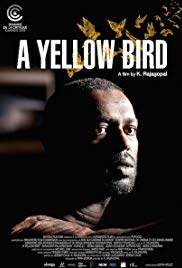
A YELLOW BIRD
Singapore, 2016, 112 minutes, Colour.
Sivakumar Palakrishnan, Lu Huang, Seema Biswas.
Directed by K Rajagopal
This Is a film from Singapore, with a special focus on Singaporeans of Indian descent and of Chinese in the city.
The central character has been in prison, embittered, getting out and trying to find his wife and daughter. He is erratic, prone to violence. He belongs to a group of workers who are hired for particular ceremonies and processions throughout the city, those processions with the highly coloured dragon characters. He encounters a Chinese woman who is trying to get money to send to her children.
This is the underbelly of Singapore, those on the margins. There is a particular margin on the outskirts of the city, a countryside brothel where the woman goes to work and the man acts as a kind of guard, collecting money from the many eager clients.
This does not work out well for either of them which draws in audience sympathy, especially when there seems very little hope for the future.
1. A Singaporean drama? Slice of life? Slice of poverty life, exploitation life?
2. The title, the image of the bird, bird images in the film?
3. The settings, the images of Singapore, the outskirts, the underbelly? The city, streets, shops, poor accommodation, the water, the countryside, the makeshift country brothel? The musical score?
4. Siva’s story, the Indian background, Singapore citizen, his experiences in jail, his release, angry attitudes, checking with authorities, trying to find his wife, his love for his daughter? Her disappearance? Visiting the official officers, including his temper? The secretary, her being attracted to him, yet not able to give him the information?
5. Siva, his age, making old connections, memories of his criminal time, wanting to work?
6. The work, the glamour of the processions and costumes, funeral rituals, the team of workers, interactions amongst themselves? Payment, their being continually called up?
7. The Chinese woman, part of the group, her demanding more money, the bosses and their violent and demeaning treatment of her, her story, her children, prostitution?
8. The two encountering each other, Siva and his help?
9. The woman, going outside the city, the brothel, the other woman, the manager, Siva getting a job, checking the clients, getting the money? The wide range of clients and their continued coming? The effect?
10. Siva and the woman getting to know each other better, talking, the story and the pathos? The clash with the other prostitute? Her money being stolen?
11. Siva, getting information about his wife, the visit, the clash, the glimpses of his daughter, the wife and her condemnation of him?
12. The woman, her treatment, in the water?
13. Siva, his experiences, what future?
Published in Movie Reviews
Published in
Movie Reviews
Saturday, 09 October 2021 13:00
Nancy Drew and the Hidden Staircase
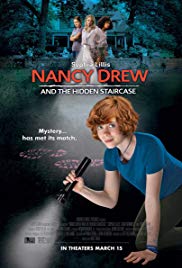
NANCY DREW AND THE HIDDEN STAIRCASE
US, 2019, 89 minutes, Colour.
Sophia Lillis, Zoe Renee, Mackenzie Graham, Andrea Anders, Laura Wiggins, Sam Trammell, Linda Lavin.
Directed by Katt Shea.
Novels by Carolyn Keene during the 1930s were very popular with their young readers, especially young girls, identifying with the central character, the teenager, Nancy Drew in her roles as reporter, detective… She is played with some zest by Bonita Granville.
During the 1970s, there was some television films. And, in 2007, there was a film simply entitled, Nancy Drew, starring Emma Roberts.
This version is adapted for the 21st-century though the spirit of the active, often hyper--active, assertive Nancy Drew from the past is certainly in the performance by Sophia Lillis (who appeared as the young Beverly Marsh, Jessica Chastain the older Beverly, in It and It, Chapter 2).
In this situation she is in a small town, trying to make friends, but finding it particularly dull. Her father has moved from Chicago after the death of his wife, Nancy’s mother. He is particularly involved in the preventing of a railway coming through the town and disrupting the way of life. A close friend from his past is leading the promotion of the railway.
We first see Nancy in tough action against a local bully, the setting of blue dye in the shower and his being transformed – and mocked by everyone. She is reprimanded by her father and by the local detective and has to do community service.
She connects with a young (looking very young) policeman in the town as well as the officer in charge. Suddenly, she becomes involved in a story where an elderly woman, played with enthusiasm by Linda Lavin, fears her house is haunted. Nancy comes in with some of her friends takes charge, finding that there certainly are some strange things going on in the house.
Which means that she has a whole lot of detecting to do, also being threatened by a local tough, and it emerges that this is one of those stories where the capitalists want to take over the house of a resistant citizen holding up the progress of their plans and resort to all kinds of devices to terrify the woman, making her feel better house is haunted and so she will sell.
So, confrontations with the toughs, her father and his friend coming into conflict, and the old lady winning her case.
Nothing startling but an entertainment for the young audience and an opportunity for Sophia Lillis in another assertive role.
Published in Movie Reviews
Published in
Movie Reviews
Saturday, 09 October 2021 13:00
Backtrace

BACKTRACE
US, 2018, 92 minutes, Colour.
Sylvester Stallone, Matthew Modine, Ryan Guzman, Meadow Williams, Christopher Mc Donald, Colin Egglesfield, Lydia Hull.
Directed by Brian A.Miller.
This action film was released straight to video – a typical enough action film for the action audience. However, if anyone wanted to see an almost complete selection of negative reviews of the film, bloggers on the IMDb were extremely condemnatory.
Sylvester Stallone has top billing although he has a supporting role, a detective on the case for seven years, clashing and cooperating with the FBI, eventually in on the final action. He relies on his screen presence rather than a performance.
Much more telling is the presence of Matthew Modine, seen first after a bank robbery with his accomplices, confronting other partners who demand more money, guns pulled and a great deal of shooting. Audiences are not sure who Modine is and, after he is wounded in the woods, he suffers from amnesia and is put in prison. The action takes up seven years later when a young man in the prison and one of the doctors there, in collaboration with a security guard, smuggle him out of the institution so that they can inject him with chemicals and that he can backtrace his memories.
While they do this, action is complicated because of the escape, Stallone getting back in on the action, the FBI, especially in the form of Christopher Mc Donald, participating more strongly – with a twist that he was in on the original robbery situation in the past, killing some of his accomplices.
While there is a great deal of shooting in the woods early in the film, continual hails of bullets, this is repeated in a warehouse at the end, even more bullets.
The detective is sympathetic when Modine offers the money and Stallone allows him to go off with the young man and the doctor – and they are seen having drinks at the beginning of their freedom.
More of a time-passer for those who like action films – and, according to the bloggers, many of them did not.
Published in Movie Reviews
Published in
Movie Reviews
Saturday, 09 October 2021 13:00
Kiss of the Damned
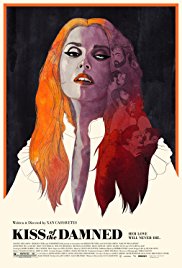
KISS OF THE DAMNED
US, 2012, 97 minutes, Colour.
Josephine de la Baume, Roxanne Mesquida, Milo Ventimiglia, Caitlin Keats, Anna Mouglalis, Michael Rappaport.
Directed by Xan Cassavetes.
This is a contemporary vampire story, United States story. The film was written and directed by Xan Cassavetes, daughter of John Cassaveetes and Gena Rowlands.
The screenplay presupposes that there are communities of vampires within contemporary society, very active in society, in the arts, a special ghetto society that parallels the broader world – they are wealthy, socially active, artists and exhibitors, fashionable clothes, even supporting synthesised blood products.
However, the central character is a vampire, Djuna, who is renting a house and has an Asian- American housekeeper. She watches DVDs and encounters the young man in the. They are instantly (if not credibly) attracted begin a relationship. He is a screenwriter and willingly becomes part of the vampire community (Milo Ventimiglia). The couple attend a number of socials with the vampires. Complications arise when the sister arrives, a troublemaker, promiscuous, vaporising and killing her lovers.
A complication arises when screenwriters agent arrives – but this subplot does not go very far.
In some ways the film seems like an exercise of writing on a particular theme, imagining by vampires as part of contemporary society as well as having to survive within their own laws.
There are some loose ends of subplots taught the end of the film but a happy ending for the couple and, quite dramatic, the troublesome sister having a car crash and then reviving as the sun comes up, struggling for shade and help on the road, despised by the housekeeper.
Principally for those audiences who are keen to see any vampire film.
Published in Movie Reviews
Published in
Movie Reviews
Saturday, 09 October 2021 13:00
Cat Returns, The

THE CAT RETURNS
Japan, 2002, 75 minutes, Colour.
English version: voices of Cary Elwes, Anne Hathaway, Peter Boyle, Tim Curry.
Directed by Hiroyuki Morita.
The Cat Returns is the only feature film by Japanese animator from Ghibli Studios, Hiroyuki Morita.
It is brief, 75 minutes, but most audiences will find it delightful, especially if they are fond of cats!
The story focuses on a young schoolgirl, Haru, who has some difficulties with her mother at home. On the way to school with a friend, she rescues a cat carrying a gift box from an oncoming lorry. It turns out that the cat is actually the Prince of the Cat Kingdom and he thanks her, promising her a reward.
There are some amusing moments when they give her a gift of a number of mice! However, like Alice in Wonderland, she is transported mysteriously to the world of cats, encountering a large, sometimes lazy, real cat, Muta, who accompanies her and helps her in many ways. She also encounters the Baron, a rather dapper cat who guides her.
She had previously met the King of the Cats who also promised her a reward and wants her to marry his son. There are many amusing adventures, some funny, some sentimental, as Haru and the cats move to the kingdom, and the court, with the King, the son, many ceremonies – with Haru becoming more like a cat.
After the adventures, Haru eventually goes home, like Alice coming from Wonderland, back to the real world, wiser after her adventures.
Published in Movie Reviews
Published in
Movie Reviews
Saturday, 09 October 2021 13:00
Rails and Ties
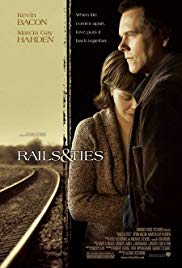
RAILS & TIES
US, 2007, 101 minutes, Colour.
Kevin Bacon, Marcy Gay Harden, Miles Heizer, Margo Martindale.
Directed by Alison Eastwood.
Rails & Ties is a small film, not often seen. And it was directed by Alison Eastwood, daughter of Clint Eastwood who also had a career as an actress.
The plot is fairly straightforward. The first focus is on a couple, he a train driver, she dying of cancer. He is reluctant to use the word ‘death’ and does not want to stay home and have time with his dying wife, preferring to drive his train. The second focus is on a physically and mentally ill mother, her 12-year-old son, her plans to drive to the rail line and for them both to be killed.
The driver makes the decision not to stop the train for fear of derailment and more injury than that of the woman who placed her car on the train line. He has to stop driving and await a hearing about his decision. In the meantime, the young boy finds out where the driver lives and goes to confront him. However, all does not turn out as might have been expected. The boy has been placed in foster care but finds a harsh mother and he runs away, finding, by contrast, a welcome from the driver and his wife, even to their accepting him as their son and not reporting him to social welfare.
There is pathos as the wife dies, as the driver decides to take responsibility for the boy – who has responded so well to their care.
1. A small film? Little-known? Themes? Cast?
2. The title, the basic ideas, trains, the crash, the orphaned boy and the consequences, Megan and Tom and their relationship with David?
3. A piece of Americana, trains and lines, homes and situations, fostering, welfare?
4. Tom, his marriage to Megan, her cancer? His sturdiness, at home? being away? driving the train, ignoring the advice to have some time off, the repartee with the drivers, driving, the chat, the car on the line, slowing down, the decision not to stop the train for fear of derailment and injury? The consequences?
5. David, at home, his mother, her illness, her devout prayer, Psalm 64 and praying it, Grace? The breakfast, the pills, taking them, giving them to David but his spitting them out, driving to the rail line, stopping at the rails?
6. David, at home, in the car, trying to get his mother out, escaping the crash? The consequences, the ambulance, the police, the rail authorities?
7. David, his age, with his mother, the impact of her death, going to the foster home, the harsh treatment by the mother, locked in his room, his escape, going to the railways, pretending to be Tom’s nephew, getting the information? Going to the house, attacking Tom, his anger and frustration? Tom and his rational replies? Megan and her care? His response to them, Tom and his train set? Tom allowing him to stay, Megan grateful? The outing, the joy and excitement, at home, David accepting Tom’s explanation? The creating of the bonds, the ties, sharing? Tom bringing David home, Megan and her love, the shopping for clothes, the social welfare inspector and their telling lies? David and his tantrum, upset, blaming himself for his mother’s death? With Megan, the sadness of her dying and the effect on David? With Tom, going to the building, the future?
8. Megan, childless, Megan being honest about talking of death, Tom reluctant? The suffering, the visits of her friend, looking after her? The argument with Tom, making the case for keeping David? The effect of David’s presence on them both?
9. The hearing, the witnesses, Tom explaining his case, David wanting to be present at the hearing? Tom being found not guilty?
10. The issue of care, fostering and harsh adults in their treatment of children? The inspector, her questions – seeing them at the outing and not reporting them?
11. The impact of Megan’s death? Tom and his talking about school David’s future? The hopes for a future?
Published in Movie Reviews
Published in
Movie Reviews
Saturday, 09 October 2021 13:00
x and y
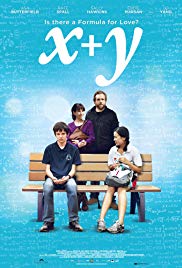
x & y
UK, 2014, 111 minutes, Colour.
Asa Butterfield, Sally Hawkins, Rafe Spall, Eddie Marsan, Jo Yang.
Directed by Morgan Matthews.
x & y might remind audiences of chromosome symbols. Others might recognise algebra, mathematics and equations and formulas. And this is correct. This is the focus in this film – but much more.
Morgan Matthews, a prolific documentary filmmaker, directed a documentary in 2007 about the international Mathematics Olympiad and the students involved. The story stayed with him and he decided to experiment with turning the documentary material into a fiction narrative.
The centre of the film is, at first, a little boy, and then his growing into a teenager. The boy is shy, has little relationship with his mother, but bonds strongly with his father who plays with him, affirms him, lovingly encourages him. When the father is suddenly killed in a car accident, the boy seems to withdraw into himself. Audiences familiar with stories of children with autistic behaviour, will recognise that the little boy, Nathan, seems to be autistic but with a great talent for mathematics and solving puzzles.
His devoted mother, Julie (Sally Hawkins) tries to reach out the boy lacks empathy for her. When she approaches the authorities at school, they recommend that special tuition from one of the teachers who had a strong maths academic record, suffers from a form of palsy, but works with special students, Martin (Reith Spall). Nathan works with him for several years, making progress with Martin’s care and attention.
When Nathan becomes a teenager, he is played by the talented British, Asa Butterfield (The Boy in the Striped Pyjamas, Hugo, Ender’s Game). Martin is keen that Nathan participate in the Mathematics Olympiad. Nathan agrees and goes, for the first time in a plane, to Taiwan with the British candidates for the competition. Chaperoning them is Richard (Eddie Marsan, who worked so effectively with Sally Hawkins in Mike Leigh’s Happy-go-lucky). The Chinese official has a niece who is a candidate in the competition and who makes some kind of connection with Nathan. The students are very bright, some genial and friendly, others, possibly autistic, tend to be focused on themselves and communicate arrogantly. This is all very new to Nathan, reticent during the classes, just managing to get himself as one of the chosen ones for the Olympiad.
These aspects of the film will be of interest to parents and teachers, students who are interested, particularly in mathematics, as well as anyone working with autistic children.
While Julie and Martin become very friendly, Julie feeling the need of some affection after the death of her husband and with her son’s seeming indifference, and not able to connect by touch, not even telephoning her from Taiwan – something which never occurs to him. But it is the Chinese girl who also comes to England who begins something of an emotional breakthrough for him, teenage interest in girls but autistic reticence and awkwardness in responding.
The ending is not quite what it might have been anticipated, especially as regards the competition. Not every problem is solved but it seems there is some recognition by Nathan of his mother and her love for him, some moments of incipient empathy.
The British know how to make this kind of film, quite modest in scope, a very effective cast, a low-key treatment of emotion. But hopeful.
1. The title? Suggestion of chromosomes? Mathematics, equations?
2. The director, his previously making the documentary on the same theme? His decision to work in fiction?
3. The story of a child genius, talent, mathematics? Issues of autism? Origins – in nature, trauma after an accident? The personality, lacking emotional expression, lacking empathy? Training, participation, achievements?
4. The British setting, Yorkshire, the town, homes, schools? The atmosphere of competition?
5. The comparison with Taiwan, the locations, the visuals of Taipei? Flight, the group, living together, working together, the classrooms, the dormitories? Training and tests?
6. The picture of Nathan, as a little boy, his being questioned, his interest and achievement in maths, liking puzzles? not close to his mother? Close to his father, the bonding, being together, the activities, affirmation?
7. The suddenness of the accident, its effect on Nathan, his mother? At the funeral?
8. Nathan as a child, going to school, the authorities, with his mother, trying to find the best for him? The introduction to Martin? Martin’s background, his abilities, as a person, his suffering from policy? Skill in maths? The past and the Olympiad? Interacting with Nathan, the details, the each relying on each other?
9. The Olympiad, prospects, the test, Nathan and his achievement? Being chosen?
10. The trip to Taiwan, the awkwardness, in the plane, communicating with people, the effects of autism, taking things literally, sharing the room, Isaac and his pleasant communication, Luke, his arrogant manner, his talk? The meeting with Mei?
11. Richard, the chaperone, his background, his putting down of Martin? Travelling with the students, active in their training, laying down the rules, exhortations? With each of the students? His friendship with the Chinese mathematician? The discussions, plans, training? The Chinese niece and her help?
12. Nathan, reticent, being drawn out, not speaking in the classes, Richard questioning him, his knowledge, but not speaking out? The test, his awkwardness, the final question and his being chosen, the contrast with the Luke and his reactions and disappointment? Nathan’s finally getting a place in the Olympiad?
13. Going home, his experiences, with Martin, distant from his mother, the preparations?
14. The portrait of Julie, her love for her son, her feeling badly about him, his lack of physical contact, his not telephoning, his not being aware of his lack of empathy? The effect on her, having to accept it, the bond with Martin, emotional?
15. Mei, the motives, thinking their place was because of her being the niece of the expert, her place depending on it? Going to England, response to Nathan, his awkwardness with her, in the bed, the kiss, their being discovered? Her being sent home?
16. The examination, Nathan not doing anything, the decision to leave, with Martin, with his mother, going to the station? Finding Mei?
17. The ending and not everything solved? Bonding with his mother, the beginnings of an appreciation for her? Mei and bringing him a little out of himself? His possibilities for a future, personally, with mathematics?
Published in Movie Reviews
Published in
Movie Reviews